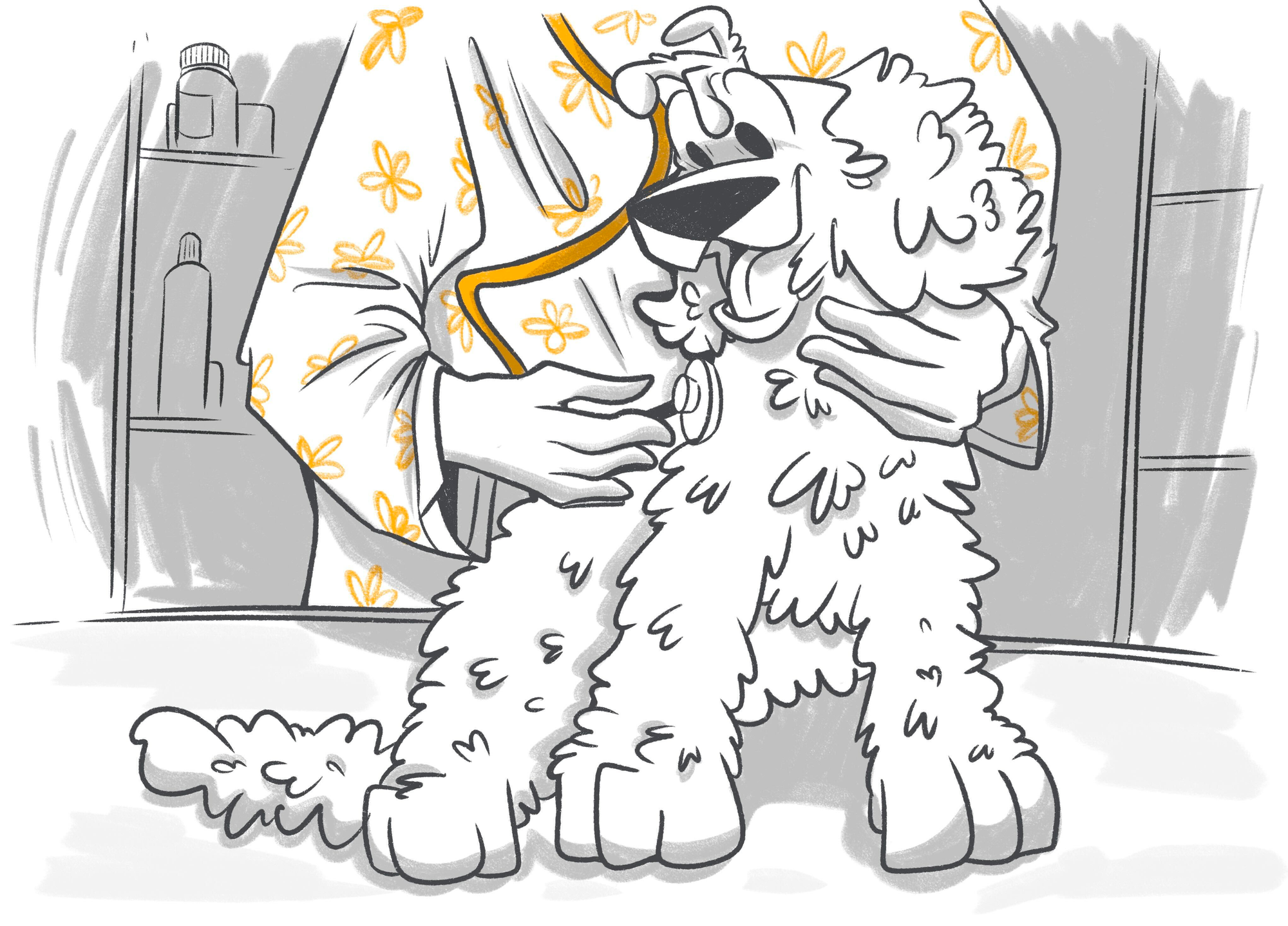As a dog owner, it’s hard not to worry if your dog is diagnosed with a heart murmur. After all, the heart is such an important organ for humans and animals alike. However, it helps to be aware of what heart murmurs mean in dogs and what you can do to help your dog.
So what does it mean, and how do you treat a dog with a heart murmur?
Firstly, there are different types of heart murmurs in dogs, with some more severe than others. However, many underlying causes of a heart murmur in dogs can be treated, especially if they are caught early on. Note that there are also innocent heart murmurs (more commonly in puppies) that are resolved in time without treatment.
Remember that consulting with your vet is important if you notice any symptoms. Regular check-ups are also recommended to help keep your dog healthy and address any health issues that they may have.
Let’s get to know more about heart murmurs in dogs, shall we?
Content:
- What is a Heart Murmur
- What are the Symptoms of a Heart Murmur in Dogs
- What Conditions Cause Heart Murmurs in Dogs
- Heart Murmur Grade
- How Are Heart Murmurs in Dogs Treated
- How Will The Emergency Fund Help With Treatment
- FAQ
What is a Heart Murmur
Like a human’s heart, a dog’s heart regularly beats, pumping blood to sustain life. When there is a disturbance to this blood flow, however, it may produce a sound called a murmur, which may be distinguished from a normal heartbeat using a stethoscope. A heart murmur in dogs is an abnormal sound in a dog’s heart that affects both the heart and blood vessels.
Stop Googling - Ask a Real Vet
So, what does it mean if your canine pal has a heart murmur, and should you be worried? The answer depends on what is causing the murmur. While there are murmurs that are physiologic or innocent, there are also those that are determined to be pathologic or caused by underlying conditions.
To determine what is causing a heart murmur in a dog, veterinarians may classify the murmur into several factors, such as the type, quality, and grade of the murmur, and look at any other accompanying symptoms that may be present.
Read more: High Blood Pressure in Dogs: How Bad Is It?
What are the Symptoms of a Heart Murmur in Dogs
Dogs with heart murmurs don’t often show any accompanying symptoms. In severe cases, however, where the murmur is due to an underlying heart condition, they may exhibit signs including:
- Coughing;
- Breathing difficulties;
- Lethargy;
- Weakness;
- Intolerance to exercise;
- Fainting;
- Skin or gums may appear bluish.
If you notice these heart murmur symptoms in dogs, consult your vet immediately to find out what is causing them. To monitor your dog, a pet camera such as the Petcube Cam would come in handy.
Its features include a 1080p full HD camera, smooth 2-way audio, and crystal-clear night vision, making it easier for you to look out for any symptoms of heart murmurs and conditions that may be causing them. Not to mention, you also get access to their Online Vet service, where you can consult with certified veterinarians online, anytime and anywhere.
What Conditions Cause Heart Murmurs in Dogs
Several diseases can cause heart murmurs in dogs. To determine the cause, your veterinarian will run some tests to confirm it. Below are some of the possible conditions that can cause heart murmurs in dogs.

Conditions That Can Cause Systolic Murmurs in Dogs
The majority of heart murmurs in dogs are systolic, and among the most common conditions that cause them is subaortic stenosis or pulmonic stenosis. This happens when the blood vessel narrows, leading to a blood flow obstruction. Among the other conditions that may trigger systolic murmurs are:
- Cardiomyopathy;
- Hyperthyroidism;
- Heartworm disease;
- Anemia;
- Mitral and tricuspid heart failure;
- Aortic valve insufficiency;
- Endocarditis of the mitral tricuspid valve;
- Systolic anterior mitral motion (SAM).
Conditions That Can Cause Diastolic Murmurs in Dogs
Although rare, diastolic murmurs in dogs are most likely due to aortic insufficiency. This condition happens when the aortic valve fails to close properly, leading to a leak. Other possible conditions that can cause diastolic murmurs include aortic and pulmonic valve endocarditis and mitral and tricuspid valve stenosis.
Conditions That Can Cause Continuous Murmurs in Dogs
Patent Ductus Arteriosis (PDA) is a common cause of continuous murmurs in dogs. Other conditions that may possibly cause it are aortic stenosis with aortic regurgitation and aortic regurgitation due to a ventricular septal defect.
Conditions That Can Cause Innocent Murmurs in Dogs
While heart murmurs may indicate heart disease, there are some that are innocent or physiologic. It means that these murmurs aren’t something to be worried about and are often resolved in time. Innocent murmurs are common in puppies and usually have a murmur grade of III or below.
Heart Murmur Grade
Among the ways that veterinarians help diagnose a dog’s heart murmur is by classifying it by its grade, where intensity, timing, duration, and location are considered. Heart murmurs are scaled from 1 to 6 (from mildest to most severe).
- Grade I: This murmur is very soft and can only be slightly heard through a stethoscope when the room is quiet.
- Grade II: This murmur is soft and audible using a stethoscope when in a quiet room.
- Grade III: This murmur has a moderate sound. It can be heard without a stethoscope. Most of the murmurs that are serious start with a grade of III or above.
- Grade IV: This murmur is loud. It can be heard without a stethoscope on either side of the dog’s chest.
- Grade V: This murmur is very loud. It can be easily heard without a stethoscope, and its vibration can be felt on the dog’s chest.
- Grade VI: This murmur is very loud. It can be easily heard without a stethoscope, and the vibration can be completely felt on the dog’s chest. This is the most severe grade among heart murmurs.
How Are Heart Murmurs in Dogs Treated

Dog heart murmur treatment involves treating the underlying condition that is causing the murmur. The treatment will depend on the diagnosis and how severe it is. As an example, the treatment for congestive heart failure is very different from treating hyperthyroidism. In some cases, especially when it comes to puppies, the murmur may resolve in time without the need for treatment.
In conclusion, when you notice any signs of heart murmurs or symptoms that may indicate a heart condition, it is vital to bring them to the vet for a proper diagnosis and treatment if necessary. Note that most murmurs can be detected during physical examinations at the vet, so regular appointments are ideal to address any health conditions early on.
How Will The Emergency Fund Help With Treatment
In some cases, dogs diagnosed with a heart murmur due to an underlying disease may need emergency veterinary care. When this happens, it will help both the dogs and their owners to have the support and assurance that they will be given proper care. Petcube’s Pet Emergency Fund is a service that offers that and more.
Petcube’s Pet Emergency Fund covers emergencies such as breathing difficulties, severe blockages, and other unexpected situations that require immediate veterinary care. With a subscription, you get $3000 a year for emergencies, which will be a great help in treating your pet.
The Pet Emergency Fund also has no restrictions as to the age, breed, or medical history of pets. You also get access to an Online Vet service that allows you to talk with certified vets 24/7.
FAQ
How to help a dog coughing from congestive heart failure?
For your dog who is coughing due to congestive heart failure, it is important to consult with your vet for proper diagnosis and treatment. Apart from medical treatment, some steps that may help manage the condition are to reduce stress, keep the air quality clean, monitor your dog’s fluid intake, and give medications as directed by their vet.
Can anxiety cause a heart murmur in dogs?
A heart murmur in dogs cannot be caused by anxiety alone. It can be caused by a variety of conditions, such as congenital heart disease, heart failure, and valvular disease, among others. Do note that these conditions may increase stress and anxiety, which may worsen the condition.
What are the causes of heart murmurs in older dogs?
Due to degenerative causes, heart murmurs may be more common in older dogs. Conditions that older dogs may be more susceptible to and may cause heart murmurs are congenital heart disease, arrhythmias, degenerative valve disease, anemia, and dilated cardiomyopathy, among other illnesses.
Was this article helpful?
Help us make our articles even better









